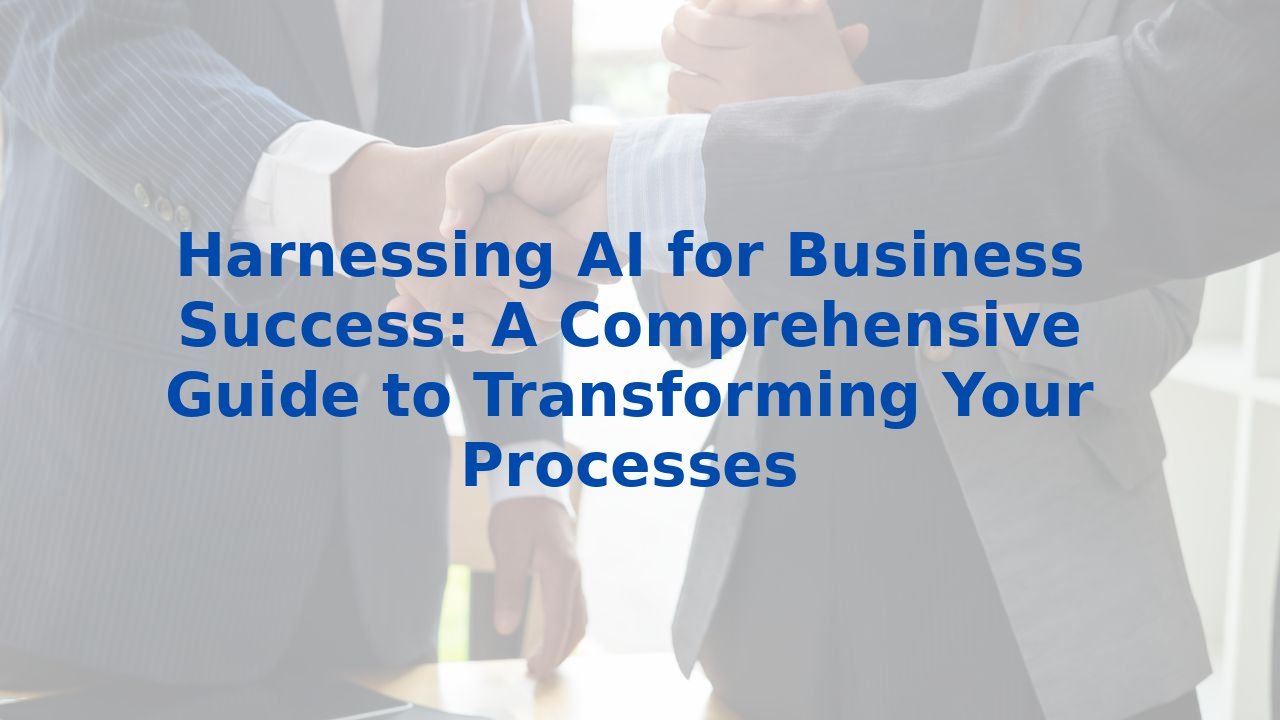Harnessing AI for Business Success: A Comprehensive Guide to Transforming Your Processes
Harnessing AI for Business Success: A Comprehensive Guide to Transforming Your Processes
In an era where adaptability isn’t just an option but a necessity, the integration of Artificial Intelligence (AI) into business processes is transforming the way organizations operate. The promise of AI is not merely in replacing human effort but in supercharging our capabilities, allowing us to work smarter, not harder.
1. Process Optimization and Automation
Imagine re-engineering the very foundation of how tasks are executed within your organization. AI streamlines procedures by automating routine tasks, liberating valuable human resources for more strategic initiatives. By leveraging historical data, AI can analyze and identify patterns, building simulation models that predict key performance indicators (KPIs) such as costs and lead times. This proactive approach empowers businesses to identify bottlenecks before they escalate into costly issues.
2. Real-Time Monitoring and Process Mining
Responsiveness is the name of the game. AI enables real-time monitoring of business processes, offering a continuous pulse on operations. It analyzes log data from various source systems to unveil insights about process flows and deviations. This capability ensures that organizations can respond to challenges instantly, leading to smoother operations and less downtime. The ability to address issues before they become major problems can redefine the efficiency of your organization.
3. Decision Support and Predictive Analytics
Decision-making thrives on information. With AI, access to extensive data and simulation scenarios enriches the decision-making process. It's not just about having data; it's about extracting meaningful insights from both structured and unstructured data. AI empowers decision-makers to evaluate potential risks and impacts effectively. Imagine automating mundane decision-making processes, allowing for quicker, error-reduced decisions that align with strategic goals.
4. Customer Service and Sales Enhancement
In a world where customer experience reigns supreme, AI is changing the game in customer service. From improving the efficiency of call center operations to assessing the quality of service interactions, AI helps businesses ensure exceptional experiences for their clients. AI-driven insights recommend optimal sales channels and prioritize leads, transforming how sales teams engage with prospects. The integration of chatbots creates an always-available resource for customer engagement, making information far more accessible.
5. Product Development and Content Generation
AI is a powerful ally in creative processes. It promotes innovation in product development through generative design, where designers set goals, and AI crafts multiple design options rapidly. Beyond product development, AI’s role in content generation significantly cuts down on time spent crafting marketing materials and product descriptions, ensuring that content is both engaging and informative. Consider the hours regained by allowing AI to handle these tasks while your team focuses on higher-level strategic thinking.
6. Human Resources and Recruitment
AI is also making waves in Human Resources, enhancing objectivity and the overall employee experience. By processing vast data points, AI aids in salary negotiations and streamlining recruitment processes. Automating initial assessments of candidates not only reduces the time-intensive aspects of hiring but also boosts the quality of hires. Companies that leverage AI in their HR practices enjoy a more effective and enriched workforce.
The Benefits of Training Employees for AI
Integrating AI into your organization’s processes is a powerhouse move, but it’s not the full picture without investing in your most valuable asset: your people. Training employees in AI technologies offers profound advantages:
- Enhanced Skills: Equip your team with the ability to analyze data, spot trends, and make informed decisions that propel the organization forward.
- Adaptability: A workforce well-versed in AI technologies is more inclined to embrace innovation, leading to smoother transitions to automated systems.
- Improved Collaboration: Trained employees will possess a deeper understanding of AI tools, fostering synergy across departments to optimize workflows.
- Innovation: When your team understands AI's capabilities, they are empowered to propose innovative solutions and continuously enhance processes.
Conclusion
Artificial Intelligence is more than just a technological advancement – it’s a catalyst for profound change within organizations. By automating processes, improving decision-making, and enhancing operational efficiency, AI has the potential to give businesses a distinct competitive advantage. Coupled with meaningful employee training in AI-related skills, organizations can maximize the transformative power of AI seamlessly. As you navigate the future of business, remember: it’s about harnessing AI not as a replacement, but as a partner in achieving unprecedented levels of efficiency and productivity.
If you’re ready to embark on this transformative journey, consider exploring comprehensive training for your organization to equip your workforce with the necessary AI skills. For more information, visit our About us page and discover how we can support your business's evolution.



